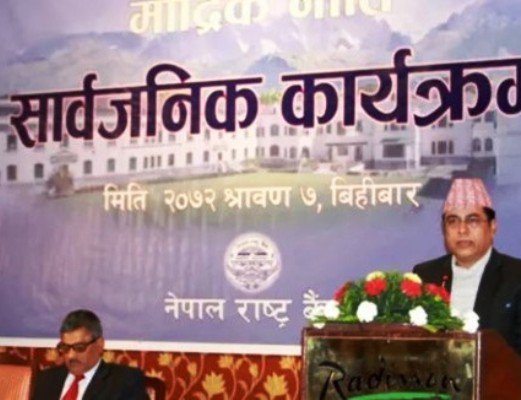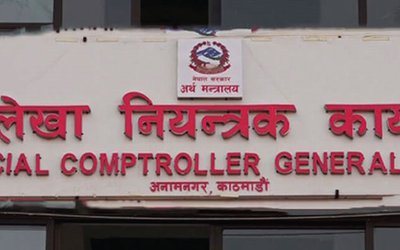
Despite facing severe opposition from a small but powerful group, Nepal Rastra Bank’s Governor Dr. Chiranjibi Nepal is determined to implement one of the main clauses of the new monetary policy to raise the paid-up capital to 8 billion rupees for commercial banks by mid-July 2017.
With the low paid up capital, opening BFIs is easier than opening a small grocery. However, the new policy announced by governor Dr. Nepal is likely to squeeze the numbers, making it difficult to open new banks.
Although the commercial banks are divided for and against the governor’s new announcement, the new arrangements are likely to reduce the current number of commercial banks in the country.
At a time when the new policy has brought a new environment in the banking sector, governor Dr. Nepal has now amended the policies introduced by previous governor Dr. Yubaraj Khatiwada, limiting and restricting the role of the bank’s promoters to choose an effective management.
With the increase in the paid-up capital, there is the need to increase the freehand given to bank promoters and managers to take a decision.
More than two dozen commercial banks will have no option other than to go for merger with many banks with smaller paid up capital. Similarly, the number of development banks and finance companies will drastically decline.
Nepal Banker's Association has demanded at least five times increase in the capital. Issuing a statement, chief executive officer of NMB and president of Nepal Banker's Association Upendra Kanta Paudyal has urged Nepal Rastra Bank to reconsider its announcement.
However, governor Dr. Nepal declined to backtrack. “The bankers have enough time to increase their paid-up capital. There is no question to retreat from the current decision which will ultimately encourage a healthy banking system,” said Dr. Nepal.
Some argue that the new policy is likely to drag the money into the banking sector. However, Nepal Rastra Bank governor Nepal sees this will make the bank’s economy healthier and stronger.
Along with three government's, commercial banks Nepal Investment Bank Ltd, NABIL Bank, Himalayan Bank, SBI, Standard Charter, Global IME Bank, Bank of Kathmandu and Everest Bank can easily raise the paid up capital.
Of the class 'A' commercial banks, only state-owned Rastriya Banijya Bank Ltd (RBBL) and Agricultural Development Bank Ltd (ADBL) meet the minimum paid-up capital of Rs 8 billion. According to NRB, RBBL's paid-up capital stands at Rs 8.59 billion while ADBL has paid-up capital of Rs 9.64 billion as of mid-April.
Similarly, Nepal Bank Ltd, Global IME Bank and Nepal Investment Bank have paid-up capital of Rs 6.47 billion, Rs 5.01 billion and Rs 4.77 billion respectively, as of mid-April.
The new policy will affect commercial Banks mainly Janta Bank, Bangladesh Bank, Civil Bank, Citizen Bank, Century Bank, Sun Rise Bank, NIC-Asia bank, Kumari Bank, Sanima Bank, Grand Bank and NMB Bank. Most of the development banks will have no option other than to go merger.
Realizing Monetary Policy for Fiscal Year 2015/16, NRB introduced the additional capital requirement for the banks and financial institutions (BFIs) 'to make their capital base stronger'. At present commercial banks are required to maintain a minimum paid-up capital of Rs 2 billion.
Under its new monetary policy, NRB has also raised paid-up capital requirements for development banks and finance companies. According to the new provisions, national-level development banks will be required to raise their paid-up capital to Rs 2.5 billion. But development banks which have working areas of 4-10 districts need to raise paid-up capital to Rs 1.2 billion.
Under the new policy, development banks which cover 1-3 districts will have to increase their capital base to Rs 400 million. National-level finance companies and other finance companies with working areas in 4-1- 10 districts will have to increase their capital base to Rs 800 million, while those finance companies with working areas of one to three districts will have to raise their paid-up capital to Rs 400 million.
The central bank has also increased paid-up capital requirements for development banks and finance companies. According to the new provision, national-level development banks will be required to raise their paid-up capital to Rs 2.5 billion, while development banks that have working areas of 4-10 districts will have to raise paid-up capital to Rs 1.2 billion. Similarly, development banks that have working areas in 1-3 districts will have to increase their capital base to Rs 400 million.
National-level finance companies and other finance companies with working areas in 4-1- 10 districts will have to increase their capital base to Rs 800 million and finance companies working areas of one to three districts will have to raise their paid-up capital to Rs 400 million.
At a time when some bankers are opposing the move saying the policy is directed to control banks, others see this is the consolidation process of the banking industry started by the central bank a decade ago. In the two years, the consolidation process will reach to a logical end.
NRB argues that the provision of additional capital requirement will also help to ensure corporate governance in the BFIs. This will also help free a bank from the grip of a certain group or people, which will also help ensure corporate governance.
"It is very impractical to ask BFIs to raise their paid-up capital by four times within a short period of two years," Upendra Poudyal, president of Nepal Bankers Association."This is bad for banking industry.”
With many ambitious policies, new governor of Nepal Rastra Bank (NRB) Chiranjibi Nepal unveiled a new Monetary Policy aiming to limit the annual inflation up to 8.5 percent.
The central bank has said that it brought the new provision to increase the paid up capital of the BFIs to strengthen the capital base of the banking system and ensure financial stability.
“It is necessary to increase paid-up capital to enhance the capacity of the BFIs. This is a prerequisite for the sound financial health of the banking system,” said NRB Governor Chiranjibi Nepal.
At a time when some bankers are opposing the move even putting the pressure through politicians, the new policy announced by governor Dr. Nepal is likely to tighten the monetary policy and create healthy banking environment ending a decade long fraud and anarchy in the banking sector.
- TANAHU HYDROPOWER PROEJCT: A Significant Achievement
- Apr 15, 2024
- AMBASSADOR HANAN GODAR: Sharing Pain With A Nepali Family
- Mar 30, 2024
- VISIT OF KfW AND EIB TO NEPAL : Mission Matters
- Mar 25, 2024
- NEPAL BRITAIN SOCIETY: Pratima Pande's Leadership
- Mar 24, 2024
- NEPAL ARMY DAY: Time To Recall Glory
- Mar 15, 2024
















